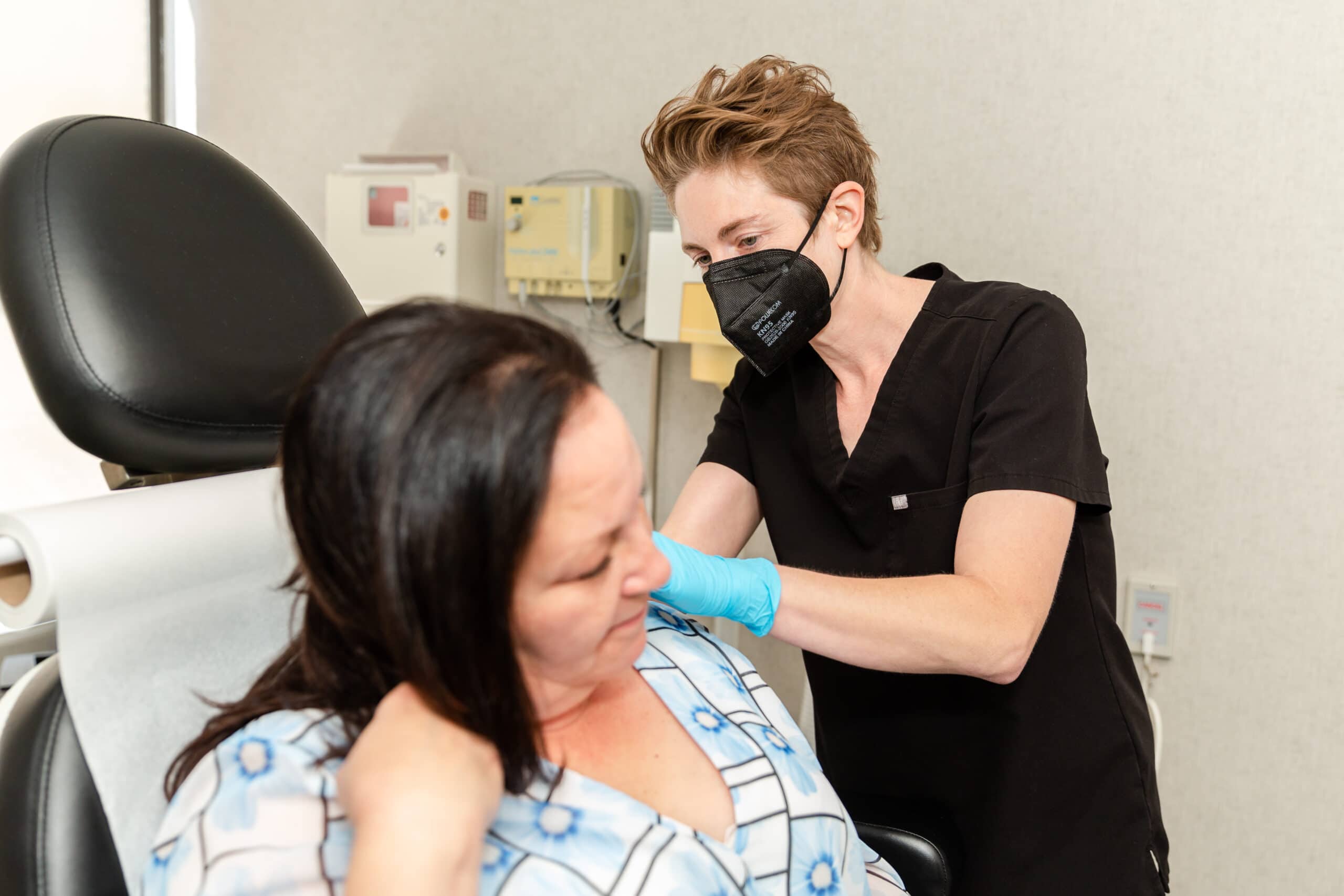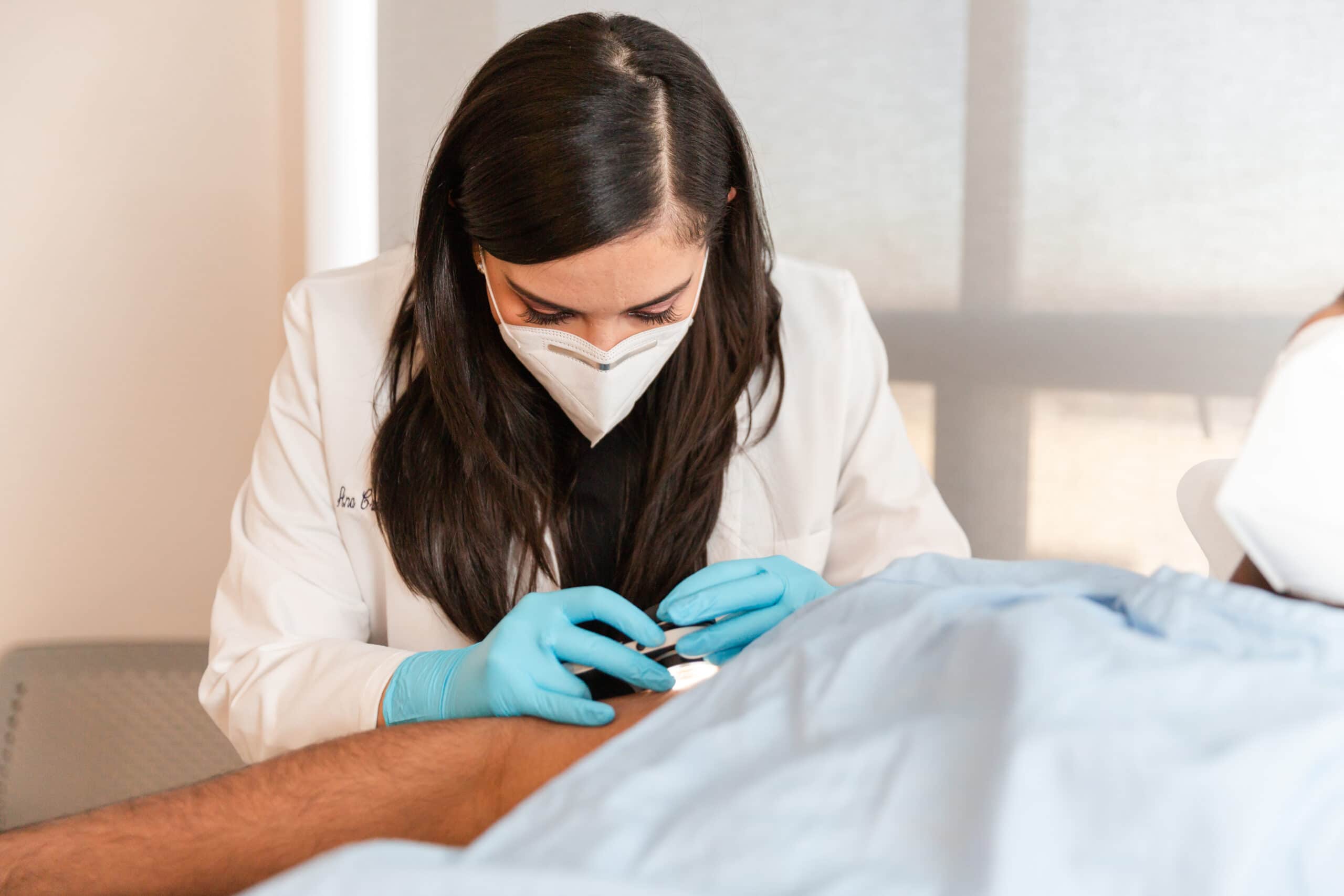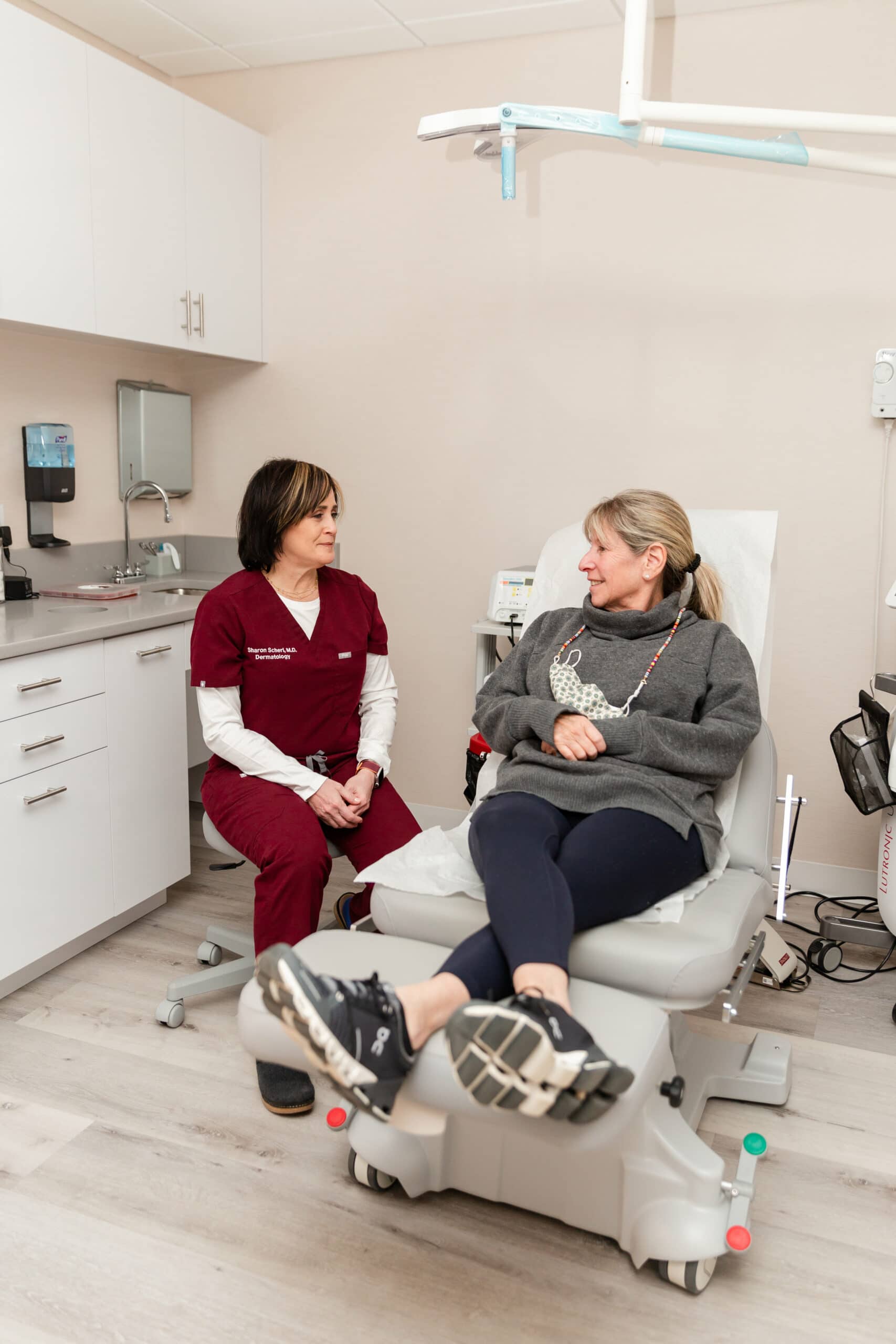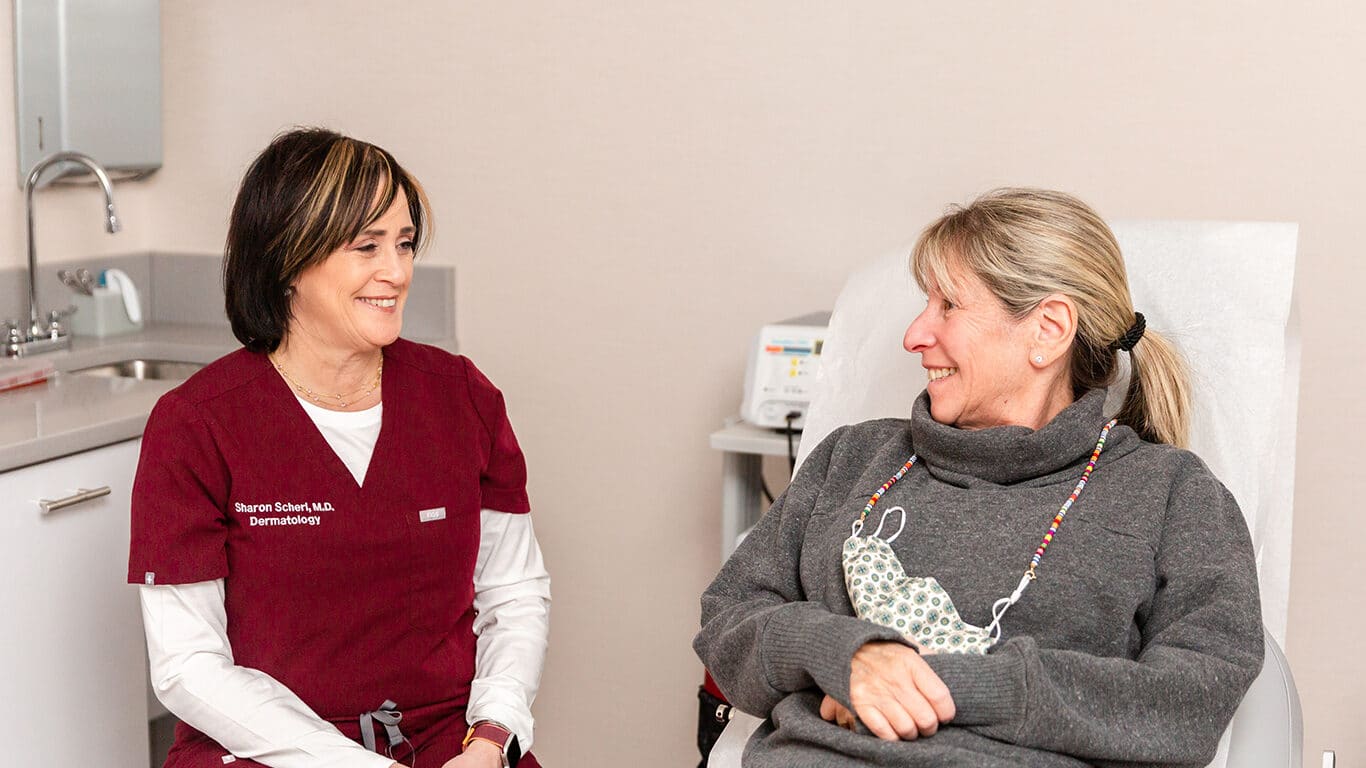
Skin Cancer
Skin cancer is the most common type of cancer in the United States, with more than 9,500 Americans diagnosed each day. Regular skin checks with a board-certified dermatologist can significantly improve an individual’s chance of early detection.
Skin cancer is the most common cancer worldwide, according to the Skin Cancer Foundation. One in every five Americans will develop skin cancer by the age of 70. It is also a deadly disease—more than two people in the U.S. die of skin cancer every hour. Early detection is essential to ensuring effective treatment and a positive prognosis, which is why the board-certified dermatologists at Scherl Dermatology in Englewood Cliffs, NJ, encourage regular skin checks.
Around 90% of all skin cancers are linked to sun exposure. The disease occurs when the DNA in skin cells mutates, resulting in abnormal growth. Although sun exposure is a crucial factor, skin cancer can also develop in areas of the body that are not exposed to the sun.
What Are the Types of Skin Cancer?
There are three main types of skin cancer:
Basal Cell Carcinoma
Basal cell carcinoma (BCC) is the most common and least deadly type of skin cancer. It forms with the basal cells of the skin, which are just underneath the outermost skin layer of the epidermis. Basal cell is characterized by tumors that form on the skin’s surface and may resemble a red patch, scar, sore, or bump with a central indentation and rolled edges. Basal cell carcinomas can crust, itch, bleed, or ooze. Early treatment is best for the complete eradication of the cancer and the best cosmetic result after treatment.
Squamous Cell Carcinoma
The second-most common form of skin cancer is squamous cell carcinoma, or SCC. Squamous cells within the epidermis become abnormal and accelerate growth, usually as a result of sun exposure. These cancers typically form on sun-exposed areas like the face, neck, lips, ears, arms, hands, back, legs, and bald scalp areas. However, they can also occur on other areas of the body not exposed to the sun, such as the genitals. SCCs signs are:
- Open sores that don’t heal
- Thickened and rough skin patches
- Red areas
- Raised growth with a central depression or a scaly surface
This cancer kills more than 15,000 people every year in the U.S.
Melanoma
Melanoma is the most dangerous type of skin cancer. Fortunately, it is also the least common. This type of cancer develops in the melanocytes, skin cells located at the deepest layer of the epidermis. These are the cells that produce melanin, which gives skin its color. One early symptom of melanoma is a change in an existing mole that might affect the shape, color, size, or texture. In some cases, melanoma develops in a new mole. This type of cancer requires a biopsy to diagnose it correctly.
Risk Factors for Skin Cancer

Scientists have identified specific factors that increase a person’s risk for getting skin cancer:
- Fair skin, especially combined with blond or red hair and blue, green, or gray eyes
- A history of bad sunburns, especially blistering sunburn
- Skin that burns or freckles rather than tans
- Multiple moles (50 or more) or moles diagnosed as atypical nevi or dysplastic nevi
- Family history of skin cancer, particularly when the diagnosed family member is a parent, sibling, or child
- Personal history of skin cancer or actinic keratoses (AKs)
How to Prevent Skin Cancer
The best way to treat skin cancer is to prevent it. These steps can help to lower your risk of this dangerous disease significantly:
- Avoid sun exposure between 10 am and 4 pm when UV rays are strongest
- Do not sunbathe or use tanning beds
- Always wear protective clothing, UV-blocking sunglasses, and a broad-brimmed hat
- Use a broad-spectrum sunscreen with an SPF 30 or higher daily, even when it’s cloudy
- If outside for extended periods, reapply sunscreen every 2 hours or after sweating or swimming
- Perform a self-assessment on your skin monthly to look for new or changing moles
- Have a professional screening with a board-certified dermatologist annually
How to I Know If I Have Skin Cancer
It is essential to schedule an appointment with a board-certified dermatologist whenever you notice any changes or other concerning symptoms on your skin. Keep in mind that not all skin changes are due to cancer. However, a prompt evaluation and diagnosis can ensure that whatever your skin concern might be, we can treat it quickly and correctly at our Englewood Cliffs, NJ office for the best possible result.
Skin Cancer Treatments

Mohs Surgery
Doctors consider Mohs surgery as the gold standard surgical technique for treating basal cell carcinoma (BCC) and squamous cell carcinoma (SCC). We also occasionally recommend Mohs surgery for more aggressive skin cancers such as melanoma. This precise procedure removes very thin layers of skin until all cancerous tissue is eliminated from the area.
Photodynamic Therapy
Photodynamic Therapy (PDT) is a medical treatment that involves two steps: the use of a light-sensitive drug and the application of a light source to destroy abnormal cells. The drug used in PDT works by eliminating cancerous and precancerous cells and treating sun damage. When combined, the photosensitizer and light source causes a reaction that can remove unwanted cells and provide you with a healthy, improved appearance.
Curettage and Electrodesiccation
This surgical procedure may be used to treat small basal cell and squamous cell skin cancers. It involves scraping the tumor with a curette (a surgical instrument shaped like a long spoon) and then using an electric needle to gently cauterize (burn) the remaining cancer cells and some normal-looking tissue. This scraping and cauterizing process is typically repeated 3 times. The wound tends to heal without stitches.
LEARN MORE AT YOUR CONSULTATION IN ENGLEWOOD CLIFFS, NJ TODAY
Don’t wait to ensure your skin is healthy and cancer-free. Contact our office today to schedule your consultation.
OTHER Medical DERMATOLOGY
Mohs Surgery
Mohs surgery is the most effective treatment for certain types of skin cancer. Skin cancer is the most common type of cancer in the United States and around the world. While dangerous, skin cancer is treatable with early detection.
Photodynamic Therapy
Photodynamic Therapy (PDT) is a medical treatment that involves two steps: the use of a light-sensitive drug and the application of a light source to destroy abnormal cells.
Phototherapy
The narrowband phototherapy lightbox is Scherl Dermatology’s latest innovative treatment. Carefully controlled, it is an extremely effective tool for treating inflammatory skin conditions such as psoriasis and eczema.
Barnacles
Barnacles are a very common benign growth. See your dermatologist if you are concerned, because skin cancer can sometimes look similar to a seborrheic keratosis to an untrained eye.
Moles
It is usually quite easy to remove moles surgically. Usually there is a trade involved – removing the mole in exchange for a small scar. If the mole is large and the scar will be less noticeable, then it is a good trade.
Rosacea
Many people suffer from rosacea. It is not contagious, but there is some evidence to suggest that it is inherited. There is no known cause or cure for rosacea.
Rash
“Rash” is a general term for a wide variety of skin conditions. A rash refers to a change that affects the skin and may appear as a red patch, small bumps or blisters on the skin.
Warts
Warts (Verrucae) are common growths that are caused by the Human Papilloma Virus (HPV). These can commonly involve the fingers, hands, feet, while certain strains can cause genital warts.
Skin Growths
REMEMBER you may have multiple types of bumps and bumps and some that may not be listed here:
- Small, hard, white bumps (milia)
- Enlarged oil glands (sebaceous hyperplasia)
Psoriasis
Psoriasis is a common inflammatory skin disease characterized by itchy or sore patches of various sizes. Often theses patches of skin have, silvery scales.
Thousands of People in the Metro Area Trust Scherl Dermatology
CONTACT US
Scherl Dermatology
Englewood Cliffs, NJ 07632
Same-Day Appointments Now Available


CONTACT US
Scherl Dermatology
140 Sylvan Ave. Suite 302,
Englewood Cliffs, NJ 07632
Same-Day Appointments Now Available
Scherl Dermatology
©2024 Schweiger Dermatology Group. All Rights Reserved. Privacy Policy | The information available on this website is provided for informational purposes only. This information is not intended to replace a medical consultation where a physician's judgment may advise you about specific disorders, conditions and or treatment options. We hope the information will be useful for you to become more educated about your healthcare decisions. If you are vision-impaired or have some other impairment covered by the Americans with Disabilities Act or a similar law, and you wish to discuss potential accommodations related to using this website, please contact us at 201.568.8400 .

